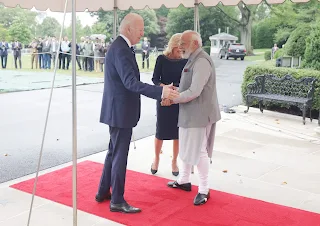The government led by Prime Minister Narendra Modi has completed a significant tenure, during which it has implemented numerous policies and initiatives that have shaped the socio-economic landscape of India. This analysis aims to provide a comprehensive examination of the Modi government, focusing on key policy areas, achievements, challenges faced, and the overall impact on the nation.
Economic Reforms and Development: Under the Modi government, several notable economic reforms have been introduced to spur growth, attract investments, and enhance ease of doing business. Initiatives such as Goods and Services Tax (GST) implementation, the Insolvency and Bankruptcy Code (IBC), and the Make in India campaign have aimed to streamline taxation, resolve corporate insolvencies, and boost manufacturing respectively. These efforts have contributed to India's economic growth, although challenges such as job creation and agrarian distress remain.
Infrastructure Development: The Modi government has prioritized infrastructure development with flagship programs like the Bharatmala project, Sagarmala initiative, and the Pradhan Mantri Awas Yojana (PMAY). These initiatives have aimed to improve connectivity, enhance port infrastructure, and provide affordable housing. While progress has been made in certain areas, challenges related to implementation delays, funding, and environmental concerns persist.
Digital India and Technology: The government's Digital India campaign has aimed to promote digital inclusion and leverage technology for governance and service delivery. Initiatives such as Aadhaar (biometric identification system), Direct Benefit Transfer (DBT), and the National Digital Health Mission (NDHM) have sought to streamline welfare schemes, improve healthcare accessibility, and enhance digital infrastructure. However, concerns regarding data privacy, cybersecurity, and the digital divide need to be addressed for a more inclusive digital transformation.
Foreign Policy and International Relations: The Modi government has actively engaged with the international community, emphasizing diplomacy and economic cooperation. Initiatives like the Act East Policy, the International Solar Alliance (ISA), and the India-United States Strategic Partnership have sought to strengthen bilateral ties, promote regional integration, and position India as a global player. However, challenges in areas such as border disputes, trade imbalances, and geopolitical dynamics require continued attention.
Social Welfare and Inclusive Growth: The government has launched several social welfare schemes to address issues of poverty, sanitation, healthcare, and financial inclusion. Programs like Swachh Bharat Abhiyan, Ayushman Bharat, Pradhan Mantri Jan Dhan Yojana, and Ujjwala Yojana have endeavored to improve sanitation, healthcare access, financial services, and clean cooking fuel availability. While these initiatives have made significant strides, equitable distribution, effective implementation, and monitoring mechanisms remain critical for sustainable and inclusive growth.
International Diplomacy: Modi has played a crucial role in elevating India's global standing through proactive diplomacy and strategic partnerships. He has engaged with world leaders, emphasizing economic cooperation, defense collaborations, and cultural exchanges. Initiatives like the Act East Policy, Make in India, and the International Solar Alliance have positioned India as a prominent player on the global stage. Furthermore, Modi's leadership has strengthened India's position in multilateral forums and increased foreign direct investment inflows.
Challenges and Criticisms: The Modi government has faced criticism and challenges on various fronts. Concerns regarding religious tensions, freedom of expression, and human rights have been raised. The handling of economic disruptions such as demonetization and the implementation of GST has faced criticism for their short-term impacts. Additionally, agricultural distress, unemployment, and environmental sustainability continue to be pressing challenges requiring focused attention and policy interventions.
The Modi government's tenure has witnessed a range of policies and initiatives aimed at driving economic growth, infrastructure development, digital transformation, and social welfare. While several achievements have been made, challenges and criticisms persist, necessitating continuous efforts and policy refinements. A comprehensive evaluation of the Modi government must consider the multidimensional impact across sectors and its implications for India's trajectory as a rapidly developing nation.


No comments:
Post a Comment